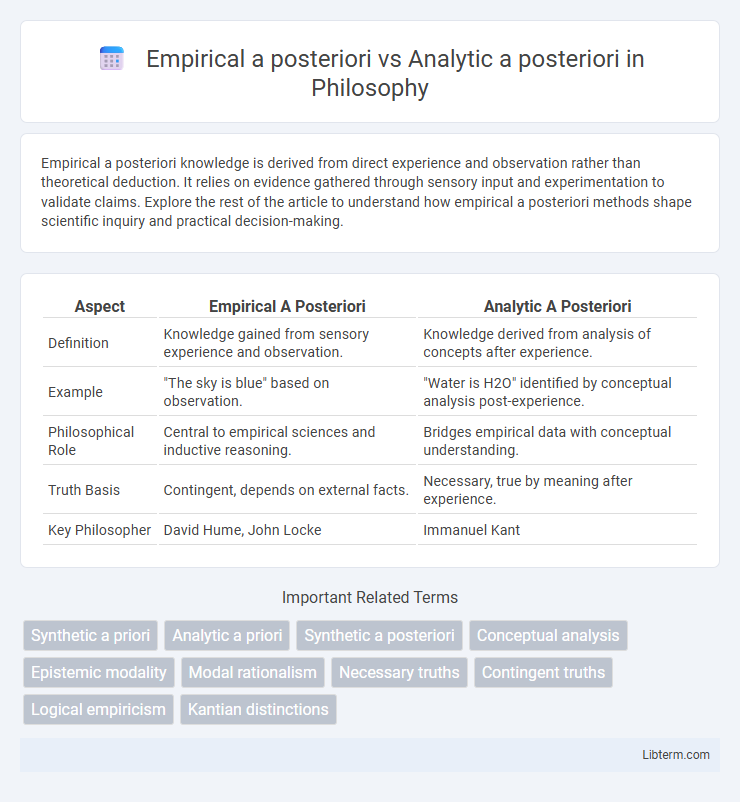Empirical a posteriori knowledge is derived from direct experience and observation rather than theoretical deduction. It relies on evidence gathered through sensory input and experimentation to validate claims. Explore the rest of the article to understand how empirical a posteriori methods shape scientific inquiry and practical decision-making.
Table of Comparison
| Aspect | Empirical A Posteriori | Analytic A Posteriori |
|---|---|---|
| Definition | Knowledge gained from sensory experience and observation. | Knowledge derived from analysis of concepts after experience. |
| Example | "The sky is blue" based on observation. | "Water is H2O" identified by conceptual analysis post-experience. |
| Philosophical Role | Central to empirical sciences and inductive reasoning. | Bridges empirical data with conceptual understanding. |
| Truth Basis | Contingent, depends on external facts. | Necessary, true by meaning after experience. |
| Key Philosopher | David Hume, John Locke | Immanuel Kant |
Defining Empirical A Posteriori: Foundations and Examples
Empirical a posteriori knowledge is grounded in observation and experience, relying on sensory data to establish truths or validate hypotheses. It contrasts with analytic a posteriori knowledge, which combines empirical evidence with logical analysis to form conclusions beyond mere observation. Examples include scientific experiments where data collection leads to new understanding, such as the empirical verification of gravitational laws through measurements and repeated testing.
Analytic A Posteriori: Clarifying the Controversial Concept
Analytic a posteriori knowledge involves understanding gained through experience that can be deduced logically from definitions and premises, challenging traditional Kantian distinctions between analytic a priori and synthetic a posteriori. This concept emphasizes that certain empirical truths are analytically knowable after experience, revealing a nuanced relationship between language, meaning, and empirical data. Clarifying analytic a posteriori knowledge helps resolve debates about the nature of concepts and the limits of empirical verification in epistemology.
Historical Perspectives: Philosophers on A Posteriori Knowledge
Empirical a posteriori knowledge, grounded in sensory experience and observation, was emphasized by philosophers such as John Locke and David Hume, who argued that knowledge derives from empirical evidence rather than innate ideas. Immanuel Kant distinguished analytic a posteriori judgments as those that are both necessarily true and informative, challenging the traditional division by introducing synthetic a priori knowledge. The evolution of a posteriori epistemology reflects debates on the sources and validation of knowledge, highlighting the interplay between experiential evidence and logical analysis in the history of philosophy.
Core Differences: Empirical vs Analytic A Posteriori
Empirical a posteriori knowledge is derived from sensory experience and observation, relying on empirical data collected through experiments or real-world evidence. Analytic a posteriori knowledge, although less commonly referenced, involves truths that are known through analysis of the concepts involved but still depend on experiential confirmation. Core differences lie in empirical a posteriori being fundamentally experiential and contingent, whereas analytic a posteriori blends conceptual analysis with empirical validation.
The Role of Experience in Knowledge Formation
Empirical a posteriori knowledge relies on sensory experience and observation as the foundation for understanding, emphasizing the accumulation of data through experimentation and real-world interaction. Analytic a posteriori knowledge, while less common, involves reasoning processes grounded in experience but demonstrates truths that can be logically deduced from empirical evidence. The role of experience in knowledge formation is central to empirical a posteriori methods, enabling verification and refinement of hypotheses through direct engagement with phenomena.
Language Analysis: Analytic Statements Explored
Analytic a posteriori statements in language analysis are those that can be verified through experience while retaining inherent truth based on linguistic definitions, blurring traditional Kantian distinctions. Empirical a posteriori focuses on statements verified solely through observation and sensory data without relying on linguistic or definitional truths. Exploring analytic statements a posteriori reveals nuances in language philosophy where semantic analysis intersects with empirical validation, impacting how truth conditions are understood in linguistic contexts.
Theoretical Implications for Epistemology
Empirical a posteriori knowledge relies on sensory experience and observation, grounding epistemology in evidence-based justification and the fallibility of human cognition. Analytic a posteriori knowledge, by contrast, challenges traditional distinctions by demonstrating that some propositions, while necessarily true, require empirical investigation for their justification. This intersection reshapes theoretical epistemology by blurring the line between analytic and synthetic truths and highlighting the complexity of knowledge acquisition processes.
Key Criticisms and Debates in Modern Philosophy
Empirical a posteriori knowledge relies on sensory experience and observation, facing criticism for its susceptibility to subjective bias and the problem of induction, where generalizations may not be logically guaranteed. Analytic a posteriori knowledge, which combines a priori reasoning with empirical verification, sparks debate over its legitimacy, challenging traditional Kantian distinctions between analytic/synthetic and a priori/a posteriori knowledge. Modern philosophy debates focus on whether analytic a posteriori judgments undermine the clear-cut epistemological categories and how this impacts the justification and scope of knowledge claims.
Applications in Science and Logic
Empirical a posteriori knowledge relies on observational data and experimentation, making it essential in scientific fields like physics, chemistry, and biology, where hypotheses must be tested against real-world evidence. Analytic a posteriori knowledge, grounded in logical deduction from definitions and axioms, plays a crucial role in formal sciences such as mathematics and logic, enabling the derivation of truths through structured reasoning. Both approaches complement each other by bridging empirical validation with rigorous analytical frameworks, enhancing the robustness of scientific theories and logical proofs.
Future Directions in A Posteriori Research
Future directions in a posteriori research emphasize integrating empirical a posteriori methods, which rely on data-driven validation and experimental feedback, with analytic a posteriori approaches that use formal logical or mathematical frameworks for verification. Advancements in machine learning and computational modeling offer promising pathways to enhance empirical accuracy while maintaining the rigor of analytic proofs. Combining these methodologies can lead to more robust adaptive systems and predictive models in various scientific and engineering disciplines.
Empirical a posteriori Infographic

 libterm.com
libterm.com